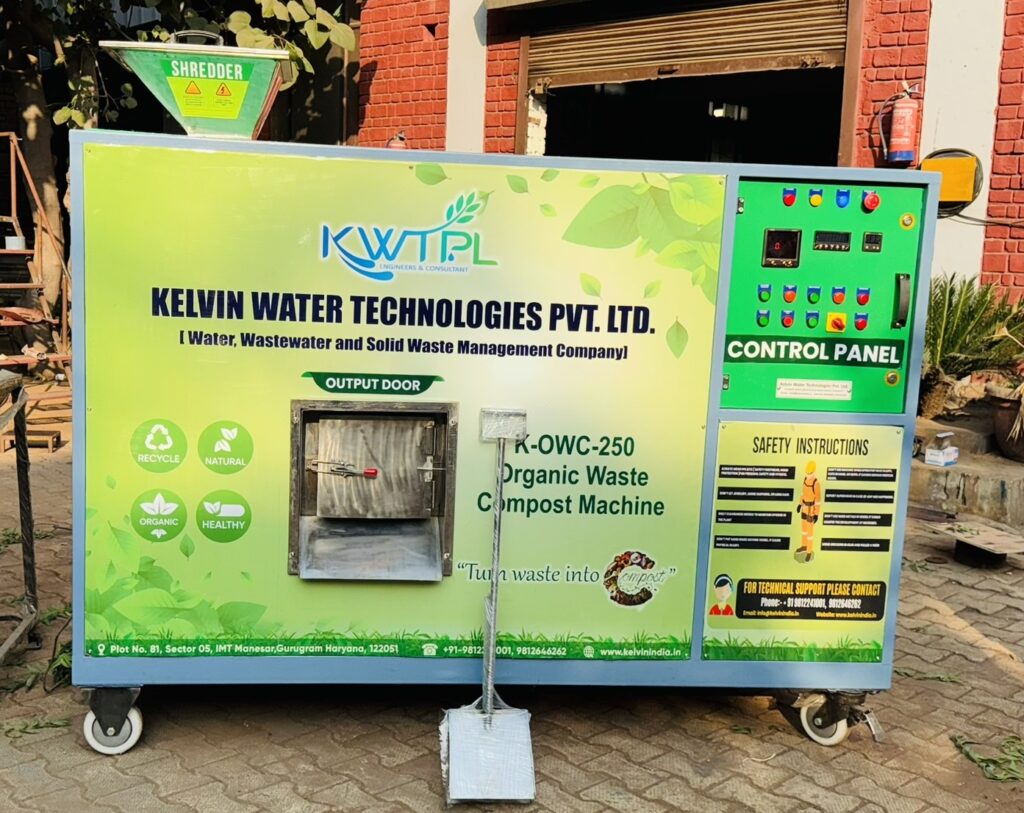What Is an Organic Waste Composter and How Does It Work?

What Is an Organic Waste Composter?
An Organic Waste Composter is a machine designed to decompose organic waste—such as food scraps, vegetable peels, garden clippings, and biodegradable materials—into compost. Compost is a nutrient-rich soil conditioner that can be used in agriculture, landscaping, horticulture, and gardening.
The composter mimics the natural composting process but accelerates it using technology. By creating a controlled environment of temperature, moisture, and aeration, the organic waste composter facilitates the microbial breakdown of organic material in a much shorter time—usually 24 to 72 hours depending on the system.
Types of Organic Waste Composter
There are several types of composting machines available, categorized based on automation and scale:
1. Manual Composters: Best suited for small-scale residential or community use.
2. Semi-Automatic Composters: Require some human intervention to mix or discharge the waste.
3. Fully Automatic Composters: Operate without manual handling, ideal for hotels, restaurants, housing societies, and municipal use.
How Does an Organic Waste Composter Work?
An organic waste composter follows a structured process divided into several stages. Here’s how the process works:
1. Waste Segregation and Input
The first step is collecting and segregating organic waste. Non-biodegradable materials like plastics, metals, and glass should be removed. The segregated organic waste is then loaded into the machine.
2. Shredding
Some composters include a shredding unit to break down large chunks of waste into smaller pieces. This increases the surface area for microbes to act on, enhancing the decomposition process.
3. Composting Chamber Operation
Once inside the composting chamber:
- The machine maintains optimal temperature (typically 50–60°C) to support microbial activity.
- Moisture levels are regulated to keep the environment conducive to decomposition.
- Aeration is provided through built-in blowers or mixers to supply oxygen.
Microorganisms—either naturally occurring or added in the form of composting culture—break down the organic matter into compost over the next 24–72 hours.
4. Curing and Maturation
In fully automatic systems, the output may be partially composted material. This may require additional curing time of 7–10 days to become fully mature compost. However, advanced models can produce ready-to-use compost directly.
5. Compost Collection
Once the process is complete, the final compost is collected from a separate outlet. It is typically odourless, dry, and rich in nutrients, making it perfect for use as a natural fertilizer.
Benefits of Using an Organic Waste Composter
✅ Reduces Landfill Burden
OWCs reduce the volume of organic waste that ends up in landfills, thus minimizing leachate formation and methane emissions.
✅ Eco-Friendly
The composting process reduces carbon footprint and encourages sustainable living practices.
✅ Produces Valuable Compost
The product is a high-quality soil conditioner that can be reused in gardens, farms, or landscaping projects.
✅ Cost-Effective Waste Management
Over time, organizations and municipalities can reduce waste disposal costs significantly.
✅ Odor-Free and Hygienic
Modern composters are fully sealed and equipped with deodorizers, ensuring a clean and odor-free environment.
Applications of Organic Waste Composter
Organic waste composters are widely used in:
- Residential societies
- Hotels and resorts
- Hospitals and healthcare facilities
- Schools and colleges
- Food processing units
- Commercial kitchens and restaurants
- Government and municipal waste management projects
Kelvin Water Technologies Pvt. Ltd.: A Trusted Name in Waste Management
Kelvin Water Technologies Pvt. Ltd. is a leading manufacturer and supplier of organic waste composters in India. With a strong commitment to sustainable and smart waste management solutions, Kelvin offers a comprehensive range of fully automatic and semi-automatic composting machines.
Why Choose Kelvin Water Technologies?
1. Advanced Technology: Kelvin’s composters are equipped with intelligent sensors, touch-panel controls, and automated operations.
2. Custom Solutions: Available in capacities ranging from 25 kg/day to 2000 kg/day, suitable for various scales and industries.
3. Durable Build: Machines are made of high-grade stainless steel, ensuring longevity and corrosion resistance.
4. Energy Efficient: Designed to consume minimal power while delivering high-efficiency composting.
5. Service & Support: Kelvin offers excellent after-sales support, installation services, training, and AMC (Annual Maintenance Contract) options.
Kelvin’s Organic Waste Composter Features
- Fully automatic operation
- In-built shredder and moisture control
- Odor control unit with bio-filter
- Compost ready in 24–48 hours
- Low noise and energy consumption
- Compact and aesthetic design for indoor/outdoor installation
Environmental Impact
Implementing composting systems at the source helps reduce municipal solid waste, lower transportation emissions, and promote soil regeneration. By diverting biodegradable waste from landfills, Kelvin’s composters play a vital role in:
- Reducing urban pollution
- Supporting agriculture with natural compost
- Promoting Swachh Bharat and Zero Waste policies
Conclusion
An Organic Waste Composter is more than just a machine—it’s a step toward environmental responsibility and resource recovery. By transforming waste into wealth, composters help address the pressing issue of organic waste management in urban and rural areas alike.
With innovative solutions offered by Kelvin Water Technologies Pvt. Ltd., adopting sustainable waste treatment practices has never been easier or more efficient. Whether you are a housing society, hotel, or municipality, integrating an organic waste composter can not only enhance your waste management efficiency but also contribute significantly to a greener planet.